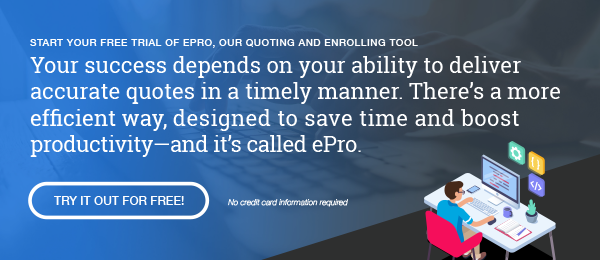Becoming a successful insurance agent doesn’t just happen overnight. The brokers with the biggest books of business have honed their skills, built lasting relationships, and put in a lot of hard work. If you are just starting out, what do you need to succeed in insurance sales?
The answer may not be as complicated as you think. Even if you don’t have years of experience, you have tools and skills at your disposal that can help you stand out from the competition, improve your sales strategies, and grow your insurance business.The insurance market is unique. While health insurance is not the most exciting product, it is absolutely essential. Engaging with prospects and moving each conversation toward a sale requires great communication skills and a drive to succeed.
Strong relationships with clients and other industry professionals can give you an edge in your market and distinguish your products and services from your competitors. Many good agents give up too quickly or do not recognize their own potential.
It doesn’t have to take years of effort before seeing results. On the contrary, insurance sales success has more to do with your ability to effectively connect with clients, know your market, be persistent, and lead with integrity and authenticity.
Tips to Success
Successful insurance sales agents have several things in common:
Communication Skills
Sales professionals need to communicate well in-person, over the phone, via email, and through social media outlets. In a busy market flooded with competition, every conversation is critical to your sales success. Confidence and trust is the core to every strong client relationship, but if communication skills don’t come naturally to you, there are ways to improve. Clearly articulating your expertise and product knowledge will help you forge meaningful connections with your prospects and clients.
Learn how to make every first impression count, even if you have to practice until you get comfortable. Get used to facing challenges and overcoming obstacles to a sale. Explore responses to common sales objections and prepare to turn challenging sales pitches into productive conversations.
Communication is important – but it has to be on your clients’ terms, not yours. Making yourself available when it is convenient for them can make or break a sale. Prospects will often purchase from the first vendor that connects with them. Don’t lose business simply because one of your competitors responded before you did. Innovative technology allows agents to be available even when they are working with other clients. Customer Relationship Management (CRM) tools that include auto-response technology can help you respond to inquiries, nurture your leads, and follow up with prospects and clients.
Mentors
Any insurance agent starting out in the industry could benefit from the advice and experience of more seasoned industry professionals. Mentors can fill in the gaps that busy sales managers simply don’t have time to address, such as how to navigate career choices and focus on your personal growth.
If your organization doesn’t offer a formal mentoring program or you’re an independent agent, how do you find someone who is willing and able to help you develop your leadership skills?
Get involved with industry associations and professional organizations to build your network and meet people from all levels of the business. Don’t get intimidated by upper level executives - they all started somewhere. Most people will appreciate the opportunity to share their stories and wisdom.
Successful professionals surround themselves with other successful professionals, feeding off each other’s energy and motivating each other. Despite the fact that life as an insurance sales agent is usually an individual effort, you can benefit by having a “team” of people who you can learn from and be inspired by.
Knowledge
Insurance can be complicated. Whether your clients are looking for individual, family, small group or Medicare plans, it is essential that you know the carriers, plans, costs and benefits available within your market. Insurance is not a tangible product like a television or car, but the decision can have far-reaching consequences. Your clients will depend on your expertise and trust that you understand the nuances of the products.
Focus on solutions provided by each plan and keep your clients informed. Online tools can give you and your clients’ immediate access to current benefits, plan details, and real-time quotes so you can position yourself as the ultimate source of insurance information.
Stay relevant – and make sure your website and social media sites reflect your knowledge of industry changes, legislation issues, and market news. Create custom content for your website and social media sites, host webinars, and design a monthly newsletter to demonstrate your expertise.
Drive
Don’t underestimate the power of persistence. The most successful brokers are incredibly driven and motivated to keep selling, regardless of the challenges they face along the way. Closing a sale often requires multiple contacts and a variety of sales techniques, but many insurance agents give up too early in the process. Frustration and rejection can be a part of the business, but most successful agents will take each failure as a chance to learn and improve and then quickly move on to the next opportunity.
Keep pushing yourself to improve in all areas of your business – and use your experience to set goals, moving the bar higher each quarter. Focus on areas in need of improvement, such as lead generation and management, response times, referrals, and sales. Review your marketing efforts and the return on your investment, and re-evaluate after each campaign. Don’t settle for the status quo when you are capable of working toward even greater success. The brokers with the most lucrative businesses are hungry for a sale and relentless in their pursuit of success.
Authenticity
Success can be quantified by sales and commissions, but health insurance needs to be measured in terms of value and client satisfaction. You are not just selling a product - you are building a relationship, based on integrity and empathy. Scripted sales pitches and spiels will turn off prospects and have them doubting your sincerity. Focus on the value of your products and services – and demonstrate what you can do to help each client find the insurance plan that best meets their specific needs.
Health insurance is an essential part of your clients’ lives, but every customer has a unique story. Get to know your clients, their families and priorities, and explore the common ground you share. Your conversations should be professional and friendly, and your personality should shine through. Avoid using health insurance industry jargon and acronyms. Instead, approach each client with empathy, compassion, and integrity. Invest in your clients’ well-being and establish the strong, long-term relationships that will keep customers loyal to you and encourage referral business.
Succeed in Insurance Sales
“Nothing worth having comes easy.” We could all use a reminder that a fulfilling, successful career in insurance sales may not be easy, but your hard work and persistence will be rewarded. With the right tools, attitude, and knowledge, you can be on your way to a successful sales career in the health insurance market. It can be challenging to get started, but with the help of innovative tools, creative sales tactics and communication skills, mentors, and your personal drive and determination, you will elevate your business, build your brand as an industry leader, and increase sales and revenue.
-1.png?width=1920&height=1200&name=QT-Logo-Big%20(1920)-1.png)




